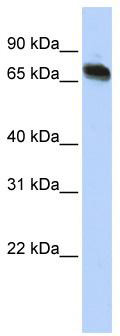TAF15 Rabbit Polyclonal Antibody
Frequently bought together (2)
Transient overexpression lysate of TAF15 RNA polymerase II, TATA box binding protein (TBP)-associated factor, 68kDa (TAF15), transcript variant 1
USD 396.00
Other products for "TAF15"
Specifications
| Product Data | |
| Applications | WB |
| Recommended Dilution | WB |
| Reactivities | Human |
| Host | Rabbit |
| Isotype | IgG |
| Clonality | Polyclonal |
| Immunogen | The immunogen for anti-TAF15 antibody: synthetic peptide directed towards the N terminal of human TAF15. Synthetic peptide located within the following region: PDYGQQDSYDQQSGYDQHQGSYDEQSNYDQQHDSYSQNQQSYHSQRENYS |
| Formulation | Liquid. Purified antibody supplied in 1x PBS buffer with 0.09% (w/v) sodium azide and 2% sucrose. Note that this product is shipped as lyophilized powder to China customers. |
| Purification | Affinity Purified |
| Conjugation | Unconjugated |
| Storage | Store at -20°C as received. |
| Stability | Stable for 12 months from date of receipt. |
| Predicted Protein Size | 62 kDa |
| Gene Name | TATA-box binding protein associated factor 15 |
| Database Link | |
| Background | Initiation of transcription by RNA polymerase II requires the activities of more than 70 polypeptides. The protein that coordinates these activities is transcription factor IID (TFIID), which binds to the core promoter to position the polymerase properly, serves as the scaffold for assembly of the remainder of the transcription complex, and acts as a channel for regulatory signals. TFIID is composed of the TATA-binding protein (TBP) and a group of evolutionarily conserved proteins known as TBP-associated factors or TAFs. TAFs may participate in basal transcription, serve as coactivators, function in promoter recognition or modify general transcription factors (GTFs) to facilitate complex assembly and transcription initiation. Its gene encodes a subunit of TFIID present in a subset of TFIID complexes. Translocations involving chromosome 17 and chromosome 9, where the gene for the nuclear receptor CSMF is located, result in a gene fusion product that is an RNA binding protein associated with a subset of extraskeletal myxoid chondrosarcomas. Initiation of transcription by RNA polymerase II requires the activities of more than 70 polypeptides. The protein that coordinates these activities is transcription factor IID (TFIID), which binds to the core promoter to position the polymerase properly, serves as the scaffold for assembly of the remainder of the transcription complex, and acts as a channel for regulatory signals. TFIID is composed of the TATA-binding protein (TBP) and a group of evolutionarily conserved proteins known as TBP-associated factors or TAFs. TAFs may participate in basal transcription, serve as coactivators, function in promoter recognition or modify general transcription factors (GTFs) to facilitate complex assembly and transcription initiation. This gene encodes a subunit of TFIID present in a subset of TFIID complexes. Translocations involving chromosome 17 and chromosome 9, where the gene for the nuclear receptor CSMF is located, result in a gene fusion product that is an RNA binding protein associated with a subset of extraskeletal myxoid chondrosarcomas. Two transcripts encoding different isoforms have been identified. |
| Synonyms | Npl3; RBP56; TAF2N; TAFII68 |
| Note | Immunogen Sequence Homology: Human: 100%; Horse: 93%; Bovine: 93%; Rabbit: 93%; Yeast: 89%; Pig: 86%; Rat: 86%; Mouse: 86%; Guinea pig: 86%; Dog: 79% |
| Reference Data | |
| Protein Families | Druggable Genome |
Documents
| Product Manuals |
| FAQs |
| SDS |
{0} Product Review(s)
0 Product Review(s)
Submit review
Be the first one to submit a review
Product Citations
*Delivery time may vary from web posted schedule. Occasional delays may occur due to unforeseen
complexities in the preparation of your product. International customers may expect an additional 1-2 weeks
in shipping.






























































































































































































































































 Germany
Germany
 Japan
Japan
 United Kingdom
United Kingdom
 China
China



